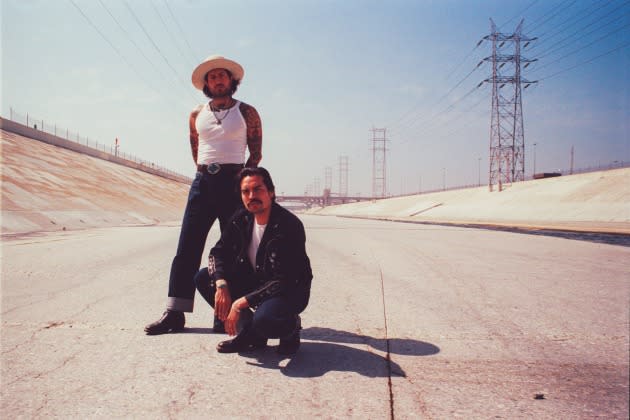How Hermanos Gutierrez and Dan Auerbach Made a Chill-Out Album for the Ages

The first time that brothers Alejandro and Estevan Gutiérrez sat down to play guitar together, something just clicked. The two had been living in different places when Alejandro invited Estevan to visit him in Zurich.
“We were just hanging out in my apartment and we just played together,” Alejandro says, on a Zoom with his brother from a Berlin hotel room. “It happened right then in that moment. I remember my flatmate came into the room. He was hearing what we were playing, like, ‘Who is that? Who is that band?’ We were like, ‘That’s us!’”
More from Rolling Stone
Dan Auerbach's the Arcs Return for First New Album in 8 Years
Tyler Childers and Dan Auerbach Will Perform for John Anderson at the Grand Ole Opry
That deep sense of connection is a key component of the Swiss duo Hermanos Gutiérrez’s new album El Bueno y El Malo, produced by Dan Auerbach and released Friday on the Black Keys singer-guitarist’s Easy Eye Sound imprint. Far from the Keys’ amped-up blues-rock or the sizzling country-soul of Easy Eye labelmate Yola, Hermanos Gutiérrez take a considerably more minimal approach to their instrumental guitar music, tracks that shimmer with hallucinogenic energy. It’s music that sings without needing a singer, that’s lyrical without needing words. That’s by design.
“We never had the feeling we needed a singer because it was always the intention of let the guitar sing — the melodies — to create the feeling that touches your heart and soul,” Estevan says.
Auerbach felt it when he first heard their music, a powerful sensation that instantly made him want to work with the brothers.
“You have to recalibrate yourself when you listen to their music,” Auerbach says. “You gotta get down in there to be able to hear it all. They have this supernatural brother bond and I don’t think they even realize how into these rhythms and deep down into these songs they exist.”
The brothers — their dad is Swiss, their mother Ecuadorian — started learning guitar in different ways. Estevan took to the syncopated Argentinian milonga style as a boy. “It was always this style that I learned,” he says, “and then in my teenage years I started to listen to Jack Johnson music, so this was an influence, but it felt like the surfer style music is not me.”
Alejandro, meanwhile, turned to YouTube to learn his instrument. “I watched tutorials and I tried to play basic chords and that was it,” he says. “But I never loved to play covers, so really soon I started to play my own songs and to get to the rhythm.”
Hermanos Gutiérrez’s compositions emphasize rhythm and timing as much as they do space (“They are Swiss,” Auerbach says with a laugh). The title track on El Bueno y El Malo rumbles like the Ennio Morricone score that inspired its name, “Los Chicos Tristes” sighs with deep melancholy, and “Cielo Grande” twinkles like a distant town at night. It’s music that’s alternately cavernous and intimate, with both brothers switching between lead and rhythm duties while the popping noises from their strings form a skeletal beat.
“We just wanted to have a fun project,” Alejandro says. “While working and writing, we had a melody that reminded us of Ennio Morricone, The Good, the Bad and the Ugly. So we thought, this could be fun, it fits to our style, the Western atmosphere we wanted to create.”
That sense of spaciousness appealed to Auerbach, who added some guitar shadings on a few tracks as well as some very subtle percussion parts. Too much of any one thing, he discovered, would throw off the delicate balance the brothers had already perfected. His mission was to preserve the evocative sounds that had caught his ear in the first place.
“It’s very close to nature, somehow. There’s something beautifully natural about it,” Auerbach says. “Some music sounds like tall, jagged buildings. This sounds like wide-open spaces in the outdoors.”
The song titles allude to that as well: “Hermosa Drive,” “Dorado Valley,” “Pueblo Man.” They’re not necessarily real places or people, but they manage to capture the feeling of each composition and an imagined version of this landscape.
“Sometimes it’s pretty clear what the song should be called, because it has a certain feeling with the melody,” Alejandro says. “Sometimes you really have to search for the right thing because the names are really important for everything to tell the story.”
Each song really does feel like a journey, an epic in miniature. Sometimes it can be hard to get a crowd’s attention without vocal hooks to be shouted back at a performer — with Hermanos Gutiérrez, they’re listening intently to small shifts in melody and momentum. At a recent gig opening for Jason Isbell at Nashville’s Ryman Auditorium, the audience hung on every note.
“We stand 100 percent to what we’re doing and we enjoy what we do,” Alejandro says. “We think it’s something new as well. You need some kind of courage as well to go to the stage and not have any vocals. We’re not hiding onstage.”
They’d never need to — as they innately understood from the first time they played, they were onto something good.
Best of Rolling Stone
